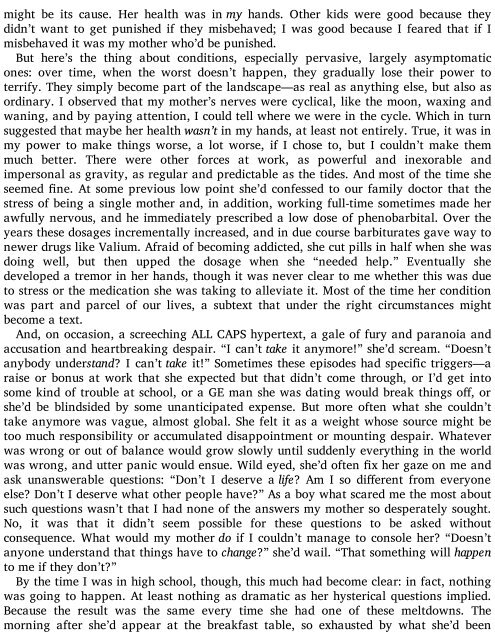8956825209375
You also want an ePaper? Increase the reach of your titles
YUMPU automatically turns print PDFs into web optimized ePapers that Google loves.
might be its cause. Her health was in my hands. Other kids were good because they<br />
didn’t want to get punished if they misbehaved; I was good because I feared that if I<br />
misbehaved it was my mother who’d be punished.<br />
But here’s the thing about conditions, especially pervasive, largely asymptomatic<br />
ones: over time, when the worst doesn’t happen, they gradually lose their power to<br />
terrify. They simply become part of the landscape—as real as anything else, but also as<br />
ordinary. I observed that my mother’s nerves were cyclical, like the moon, waxing and<br />
waning, and by paying attention, I could tell where we were in the cycle. Which in turn<br />
suggested that maybe her health wasn’t in my hands, at least not entirely. True, it was in<br />
my power to make things worse, a lot worse, if I chose to, but I couldn’t make them<br />
much better. There were other forces at work, as powerful and inexorable and<br />
impersonal as gravity, as regular and predictable as the tides. And most of the time she<br />
seemed ne. At some previous low point she’d confessed to our family doctor that the<br />
stress of being a single mother and, in addition, working full-time sometimes made her<br />
awfully nervous, and he immediately prescribed a low dose of phenobarbital. Over the<br />
years these dosages incrementally increased, and in due course barbiturates gave way to<br />
newer drugs like Valium. Afraid of becoming addicted, she cut pills in half when she was<br />
doing well, but then upped the dosage when she “needed help.” Eventually she<br />
developed a tremor in her hands, though it was never clear to me whether this was due<br />
to stress or the medication she was taking to alleviate it. Most of the time her condition<br />
was part and parcel of our lives, a subtext that under the right circumstances might<br />
become a text.<br />
And, on occasion, a screeching ALL CAPS hypertext, a gale of fury and paranoia and<br />
accusation and heartbreaking despair. “I can’t take it anymore!” she’d scream. “Doesn’t<br />
anybody understand? I can’t take it!” Sometimes these episodes had specic triggers—a<br />
raise or bonus at work that she expected but that didn’t come through, or I’d get into<br />
some kind of trouble at school, or a GE man she was dating would break things o, or<br />
she’d be blindsided by some unanticipated expense. But more often what she couldn’t<br />
take anymore was vague, almost global. She felt it as a weight whose source might be<br />
too much responsibility or accumulated disappointment or mounting despair. Whatever<br />
was wrong or out of balance would grow slowly until suddenly everything in the world<br />
was wrong, and utter panic would ensue. Wild eyed, she’d often x her gaze on me and<br />
ask unanswerable questions: “Don’t I deserve a life? Am I so dierent from everyone<br />
else? Don’t I deserve what other people have?” As a boy what scared me the most about<br />
such questions wasn’t that I had none of the answers my mother so desperately sought.<br />
No, it was that it didn’t seem possible for these questions to be asked without<br />
consequence. What would my mother do if I couldn’t manage to console her? “Doesn’t<br />
anyone understand that things have to change?” she’d wail. “That something will happen<br />
to me if they don’t?”<br />
By the time I was in high school, though, this much had become clear: in fact, nothing<br />
was going to happen. At least nothing as dramatic as her hysterical questions implied.<br />
Because the result was the same every time she had one of these meltdowns. The<br />
morning after she’d appear at the breakfast table, so exhausted by what she’d been

















